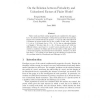Free Online Productivity Tools
i2Speak
i2Symbol
i2OCR
iTex2Img
iWeb2Print
iWeb2Shot
i2Type
iPdf2Split
iPdf2Merge
i2Bopomofo
i2Arabic
i2Style
i2Image
i2PDF
iLatex2Rtf
Sci2ools
DLT
2008
2008
On the Relation between Periodicity and Unbordered Factors of Finite Words
Finite words and their overlap properties are considered in this paper. Let w be a finite word of length n with period p and where the maximum length of its unbordered factors equals k. A word is called unbordered if it possesses no proper prefix that is also a suffix of that word. Suppose k < p in w. It is known that n 2k - 2, if w has an unbordered prefix u of length k. We show that, if n = 2k - 2 then u ends in abi , with two different letters a and b and i 1, and bi occurs exactly once in w. This answers a conjecture by Harju and the second author of this paper about a structural property of maximum Duval extensions. Moreover, we show here that i < k/3, which in turn leads us to the solution of a special case of a problem raised by Ehrenfeucht and Silberger in 1979.
Related Content
| Added | 29 Oct 2010 |
| Updated | 29 Oct 2010 |
| Type | Conference |
| Year | 2008 |
| Where | DLT |
| Authors | Stepan Holub, Dirk Nowotka |
Comments (0)

